Ireland, positioned strategically in the North Atlantic, finds itself at the nexus of a vast network of undersea fibre-optic cables, carrying about 97 per cent of the world’s communications and internet traffic.
With over 550 cables spanning 1.4 million kilometres and a staggering ten trillion euros in financial transactions pulsating through them daily, the importance of these cables cannot be overstated.
Yet, as global tensions escalate, with major geopolitical players like the United States, China, and Russia increasingly at odds, the spotlight turns to Ireland’s role in overseeing and securing these critical infrastructures. The importance impacts not only Ireland but also the broader European and global community.
This article is the opinion of the author and not necessarily that of the UK Defence Journal. If you would like to submit your own article on this topic or any other, please see our submission guidelines.
This raises a crucial question: Should Ireland take responsibility for its own security, especially in protecting these undersea cables that are vital not only for its own prosperity but also for the functioning of the global digital economy?
This article explores why Ireland should, now more than ever, take a proactive stance in securing its waters and, by extension, a significant portion of the world’s digital lifelines.
Ireland’s geographical location places it at a critical juncture in this global network. The nation’s waters are a nexus for these cables, where three-quarters of all cables either pass through or are near Irish territory. This unique positioning imbues Ireland with a strategic significance far exceeding its size. Most transatlantic communications linking Europe with North America rely on these cables that thread through Irish waters. They rely on the safety of the waters for which Ireland is responsible.
Any accidental or deliberate disruption could have a far-reaching and devastating impact. Disruptions can cripple international finance, impede critical communications, and hamper governmental operations. The strategic imperative for Ireland, therefore, is clear. As the custodian of a critical segment of this global infrastructure, Ireland must recognise and embrace its role in safeguarding these undersea cables. This responsibility is towards its citizens and the international community, which depends on the uninterrupted flow of data and transactions these cables facilitate
A disruption could destabilise Ireland, send shockwaves through the global financial system, and disrupt international communication networks. It’s a scenario that would affect nations and economies and also the day-to-day lives of people across the globe.
Recommendations from experts and analysts include:
- Strengthening the Naval Service to enable Ireland to conduct more frequent and effective patrols, ensuring a consistent presence in pivotal areas.
- Beyond expanding naval capabilities, there is a consensus on the need for Ireland to actively engage with international security frameworks.
- Although not a NATO member, Ireland can still participate in initiatives like NATO’s Critical Undersea Infrastructure Protection Cell. This involvement would facilitate the exchange of information, assessment of threats, and coordinated response strategies. It would also enable Ireland to draw upon the expertise and resources of allied nations in protecting these vital assets.
Tánaiste Micheál Martin’s recent remarks resonate with the urgency of this issue. He highlights the vulnerabilities facing communication infrastructures and stresses the need for Ireland to adopt a proactive approach.
- This involves physical security measures and technological advancements in monitoring and safeguarding the cables. Investments in underwater drones, advanced surveillance systems, and cybersecurity measures could significantly enhance Ireland’s defensive capabilities.
- Furthermore, the potential for international collaboration must be noticed. Ireland can form partnerships with other nations whose security and economic interests are aligned with the protection of these cables. Such alliances could lead to joint patrols, shared intelligence, and coordinated responses to threats, providing a more formidable defence than any single nation could achieve independently.
Recent Developments
In recent times, Ireland has witnessed significant developments in its approach to maritime security, particularly concerning the protection of undersea cables. A substantial operation was recently launched by the Irish Government in the Irish Sea, as reported by TheJournal.ie, this operation, initiated by the Department of Defence, directly responded to heightened concerns following the attacks on the Nord Stream pipelines.
It represented a concerted effort by the Irish Defence Forces, involving the Irish Air Corps and Naval Service, along with assistance from specialist units such as the Army Ranger Wing, military intelligence officers, and Communication Information Services Corps members. The primary objective of this operation was to “increase presence” in the waters above the cables and pipelines.
This operation involved targeted patrols, focusing on the natural gas interconnectors and electricity cables deemed vulnerable. The Naval Service’s deployment of at least two vessels, aimed at establishing an overt presence, was designed to monitor any suspicious ships or activities in the area. Complementing the Naval Service’s efforts, the Air Corps played a crucial role using CASA maritime patrol aircraft and PC-12 surveillance planes.
Furthermore, Ireland’s engagement in international military exercises has also been noteworthy. The participation of Irish personnel in the NATO-supported naval activity off the coast of Sesimbra, Portugal, marked a significant step on the road to taking maritime security seriously. This exercise, known as REPMUS, was the largest of its kind, involving underwater drones and featuring participation from fifteen NATO countries. Ireland’s involvement was as an observer in this exercise.
The Imperative of Ireland’s Self-Reliance
A report by The Irish Times reveals that Britain’s Royal Navy is working with Ireland to secure subsea cables in the North Atlantic using the new RFA Proteus, including areas within Ireland’s Exclusive Economic Zone (EEZ). This underscores Ireland’s limitations in independently securing its maritime assets and its reliance on its neighbour.
RFA Proteus will serve as the launchpad for remotely-operated vehicles and a home to a suite of specialist capabilities similar to those found in the oil and gas industries.
The ship, which will be operated by the Royal Fleet Auxiliary – the crucial support arm of the Royal Navy – will serve as a testbed for advancing science and technological development, enabling the UK to maintain the competitive edge beneath the waves.
The Irish Naval Service, at present, does not possess the capability to monitor these crucial cables, leaving a void filled by its neighbour.
This situation is further illuminated by a recent report detailing an incident where a Russian submarine, positioned near vital cables off Cork Harbour, was countered by British forces due to Ireland’s lack of capability in underwater surveillance.
Sinn Féin say Irish reliance on British forces ’embarrassing’
Historically, Ireland had some level of this capability. Still, due to budget constraints and prioritisation, this has waned over the years.
Ireland’s reliance on external support for its maritime security is not sustainable in the long term. It raises concerns about national sovereignty, operational independence, and the ability to respond promptly and effectively to threats within its territorial waters.
For a nation strategically located on the transatlantic communication route, the ability to autonomously secure its maritime infrastructure is not just a matter of national pride but a necessity for national security and economic well-being.
The need for Ireland to develop its own capabilities is pressing, in my opinion. As I have discussed above, this could involve enhancing the Irish Naval Service in terms of fleet size and staffing and technological advancement, such as acquiring modern surveillance equipment, underwater drones, and sonar capabilities.
Investing in these areas would bolster Ireland’s security posture and contribute to a more balanced and resilient regional security architecture. Moreover, self-reliance in maritime security would allow Ireland to exert greater control over its EEZ, protecting critical infrastructure from external threats and its neutrality.
It would also enhance Ireland’s standing as a responsible and capable actor in international security, able to contribute meaningfully to collective efforts in safeguarding vital transnational infrastructure.


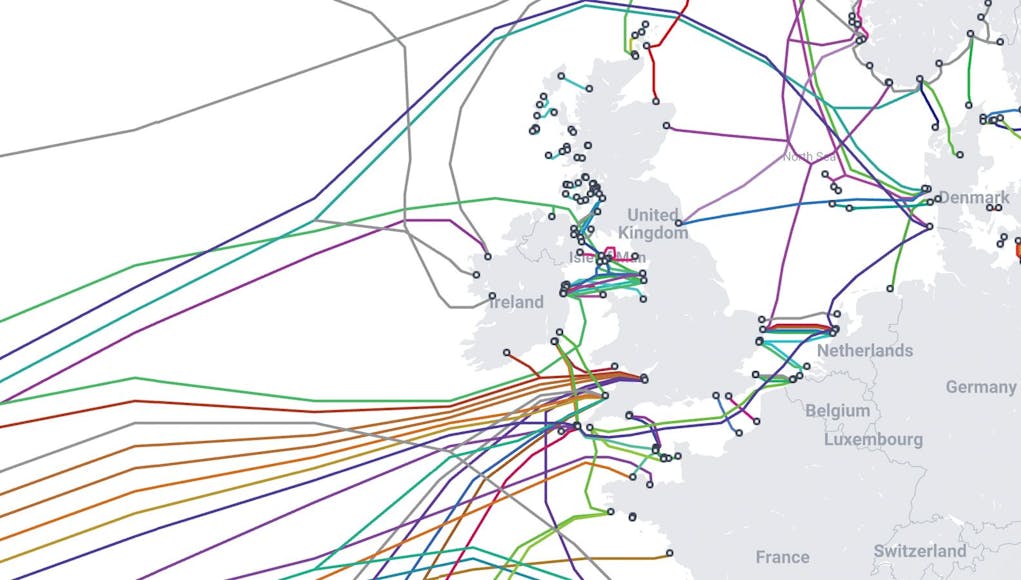
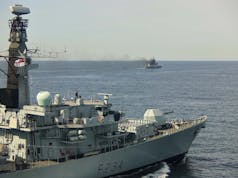
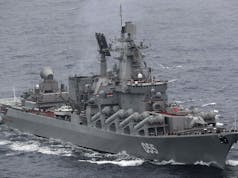
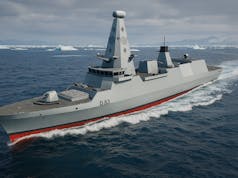

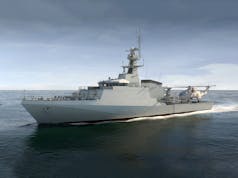

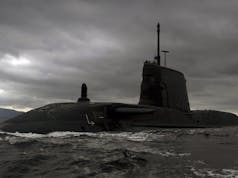
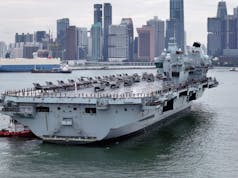
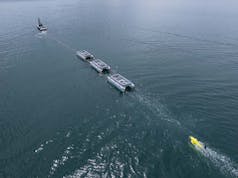
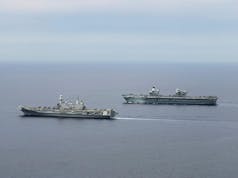

Without doubt, it’s time for Ireland to step up or pay up!
You DO REALISE that these cables provide a service for the biggest multi national companies, banks, communication companies in the world don’t you who enjoy generous profits by doing business through Ireland
If a bunch of medievalist Indian Princely States in 1884 can generate skilled cavalry, sapper and transport units for mutual defence against Tsarist Russia, then rich Ireland in the here and now can easily generate a few extra OPVs for defence against Putinist Russia.
(though they’d probably have to solve the same problems we have to solve at the moment regarding manning, logitistics and funding)
I agree Ireland needs to do more, but consider.
Ireland has a population of 5 million people which is approximately the same as Norway’s. Unfortunately they do not have Norway’s huge oil wealth. London has a population of about 8 million in comparison.
If a major power moves against in any area due to it’s strategic position it would not stand a chance anyway.
The conclusion is Ireland should be re-considering it position of staying out of alliances.
Never underestimate the Irish. Even if an invasion succeeded, holding on to her would be a nightmare for any invader!
It’s always interesting how the narrative changes arbitrarily when it comes to Ireland – either they are too little to afford these things themselves, or suddenly we should be taking lessons from their (mythological) superhigh GDP per capita.
It is strategically important for the UK and Ireland to defend all of the islands together and, as the larger, the UK will obviously do most of the heavy lifting. However, there should be a greater expectation of quid pro quo – independence means you should pull your own weight.
A couple of quick thoughts come to mind. The demise of the Royal Navy to an unfit status , has helped highlight irelands lack of resources as its big brother is no longer around at the moment .
Ireland politics I do not understand , but I’m assuming rightly or wrong that’s traditionally very anti British very socialist almost communist mentality , the mindset so strong that Ireland has stubbornly refused to get involved and takes a neutral stance as any admittance of working with uk is hard to take 🙂
Also as Ireland is in the EU , the defence of Irish sea is also an EU matter , obviously along with NATO and UK interests . France too would have an interest i guess . Its embarrassing Ireland and the UK as Island nations are struggling to cover the bare basics of protecting the seas in their vicinity
Eire might be in the EU, but there is no chance whatsoever that the French or Germans will step up and defend them. Like it or not, we are responsible for Ireland’s defence
This is true the uk has a great interest in ensuring Irelands safety
Irish fought on our side during both world wars. Years ago I had to work in Cork on a building project. One of our chaps had a Para cap badge tattoo on the back of his hand. He used to sit in the mess reading An Phoblacht, the Republican newspaper. So I asked him one day why had he joined up? His reply was that he joined the IRA first and his OC had told him to…..
Presumably joined in order to get the best military training available and gather intelligence on the most notoriously hated regiment in the British Army. What an absolute failure of the intelligence services to vet recruits properly
Then the EU can pay us to defend them.
In Euro though
The the op and replies indicate a lack of knowledge of Irish politics and and history. Pretty much every one has something incorrect. The two main parties for the majority of the Rebublic history were Conservative and are now broadly centre right with liberal economic outlook, although the left are growing there is much bigger social state in UK I’m terms of services. Ireland was neutral during WW2 (officiallly at least) due to coming out of a civil war and the Republic didn’t exist in WW1. I really have to facepalm when I read stuff as it is a shared history and doesn’t reflect well on the British public.
I agree that Ireland needs to start looking after it’s self and that includes paying for it’s own protection instead of just waiting for support from it’s closest neighbour. Sinn Fein calls it embarrassing that Ireland has to rely on the British for protection but Sinn Fein still thinks that rowing up and down the coast in a kayak with a few members of the ra with balaclavas on would keep Ireland free is what’s embarrassing.
They need to put their hands in their pockets and pay for an effective naval presence with trained personnel to manage it.
Went school with Eoin, he never showed any interest for this field back them.
What’s the issue Ireland has? Is it just struggling to attract and retain personnel or is it a deeper rooted systemic issue? Can’t really be wages, an able seaman in the INS gets 10k more than his RN oppo.
Do they need to offer joint military/civilian qualifications or something, so do time with the DF, get trained up as an electrician or engineer or mechanic or doctor, whatever, then that carries over into civilian life to ease the transfer from the forces? They’re never going to have a formidable fighting force so would a focus on peacekeeping and HADR really hurt all that much and in fact might it not help with recruitment?
Its mainly pay related issues for the Navy. First off for any qualified personnel they are paid well under the commercial rate (so for example Engineering officers are something like 1/3 what they could get in the private sector), or the more recent example where a pharma company bought out the contracts of an entire class of Navy Electricians that were in training.
Secondly, the NS base is in Cork in the middle of the huge pharma and tech sector here, so even if they aren’t being headhunted, the cost of living/housing anywhere near the base is almost impossible on their salaries. Add in extremely poor base facilities, and it has significant negative impacts on retention.
Before being too criticle of Eire’s defences we should remember just how low, weak & dysfunctional our own have been allowed to become.
A tiny army, air force & navy. 19 Escorts in the RN was a cut way too far, causing great problems for UK defence & commitments, but that’s down to 16 now & due(as far as I’ve been able to ascertain) to drop to 14 (14!!!!) as we plan to retire 2 more aging T23 frigates before the first new build T31 & T26 get commisioned in 2027/28.
We’ve routinely gapped major capabilities.
Rather than Eire being safe because”any invader would have to go through all Europe” before getting there, She can be considered the weak link easy access to Europe as an airbourne/amphibious attack could start right there.
Thankfully she has generous neighbours & allies, not least the USA & UK, if threatened. But here we are with major threats from authoratarian states considering taking advantage of the record weakness of the free world. There is no wisdom or advantage at all in having the weakest forces in the UK for a century or two.
There has always been plenty of Irish serving in our forces doing an excellent job & many came forward to help us through two world wars. We owe a great debt to Ireland. Then there’s the considerable Irish community resident here.
Ireland is part of the EU. It is the EU that should defend them.
Kai, at the risk of being re_admonished,THAT EU 🇪🇺 task may never happen.(mais non monsieur regardes le boef mangers) . I must correct you however , the Republic of Ireland is in the EU. Not Northern Ireland, which is still part of the United Kingdom.
Thanks DH, but I didnt need correcting. I am well aware that Northern Ireland is still part part the United Kingdom. The article above clearly states Ireland, not Northern Ireland.
Ok 👌, just for the sake of clarity 😊, back to the 🕳️.
Why should Ireland spend any money on protecting its airspace and seas when it can get the UK to do it for them…..?
Ireland is not poor it could afford a squadron of F16. It could also buy some capable corvette/light frigates… the fact is they do not want to spend tge cash….
The fact is also even if somehow a decision was made tomorrow to buy what you suggest, it’s still likely a decade or more before the U.K. wouldn’t be needed. Not too mention I’m not convinced that U.K. assets would still do as they do now even if we had some capability to police the EEZ.
Considering the constant brikbats aimed at the UK by that rather nasty neighbour especially that nonentity Varadkar, I’m astonished that we still maintain maritime cover for them.
The UK should ensure, for its own security, that its digital traffic, or at least its most sensitive, is routed through cables that avoid Irish territorial waters.
I’ve always had a very low opinion of Ireland’s foreign policy. Neutrality when there are clearly good and bad guys out there is a shameful position to take and then on top of that Ireland refuses to do its bit for the collective security of the democratic world.
There seems to be confusion here. While these cables are in Irish waters, they provide a service for all major companies, banks, stock exchanges, communications services in the world be they bank of America, Microsoft or Google. The richest companies in the world enjoy enormous profits by doing business through Ireland. Perhaps, they ought to contribute financially????